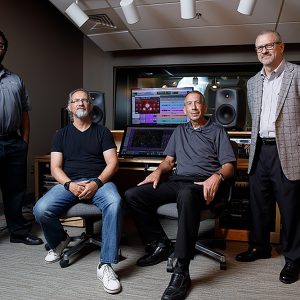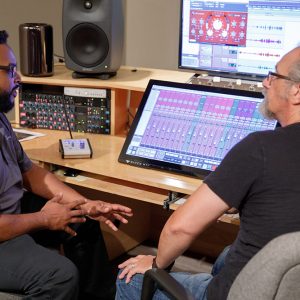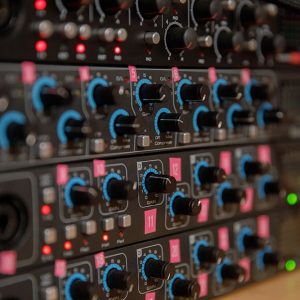
The University of Alabama is now the place where technical engineering skills and musical talent meet.
The College of Engineering added a musical audio engineering degree to its catalog this fall in collaboration with UA’s School of Music. The degree is housed in the electrical and computer engineering department.
“This is a collaboration between two colleges for a degree program. I don’t know that we’ve ever done that on this campus,” said Dr. Tim Haskew, electrical and computer engineering department head.
Students who pursue this degree will learn about recording studio operations, live recording environments and use of equipment to become fully trained audio engineers. Students must take a mixture of foundational engineering courses, like physics, electronics and calculus, as well as traditional music courses, like performance, history and theory, to earn their degree.
Haskew said the idea is to graduate students who can fully understand how to design, maintain and operate performance and recording equipment who are musically trained to know how the technical aspect can be applied in a creative context. He sees this degree path as an opportunity for students who want to be an engineer but also have a passion for the arts.
“It’s all a natural fit really,” Haskew said. “Music is very mathematical. A lot of times you will see folks with a technical background gravitate towards music.”
Charles “Skip” Snead, director of the School of Music, said many Million Dollar Band members are engineering students.
“There are many students on this campus every year that have strengths in both engineering and music. The opportunity to bring both of these to the table is certainly going to be a very attractive option for a lot of folks,” Snead said.

Tory Ezell, UA College of Engineering manager of web communication, is earning a degree in this program.
“I think it’s a cutting-edge program. It takes audio engineering to a level that is above and beyond just mixing down audio and using pro tools,” Ezell said. “It takes it to a level where the knowledge that you learn spans across multiple disciplines.”
Ezell has always had an interest in music and its technical application, and this program was the perfect combination of his interests. He wants to fuel that curiosity into building and repairing synthesizers because he appreciates the sound the instrument produces.
“That’s what steered me to the program. It specifically will give me that technical knowledge,” Ezell said.
Haskew said the engineering portion is what really sets it apart from programs that focus on the music business. Snead agreed there is much more engineering in this program and a good bit more music too. Instead of just learning audio tech and recording skills, he said the graduates from this program will be both professional musicians and engineers.
“To our knowledge, this is the first degree program of its kind in the country that literally has a balance between musical training and engineering, having a full core curriculum between both disciplines,” Snead said.
The program will be capped at 60 students who must audition for the School of Music to be accepted. Most of the courses are already established in the respective departments and only one new engineering class will be added. The degree requires a total of 126 credit hours.
“Looking at the industry, there are so many opportunities,” Snead said.
He listed community centers, religious organizations, civic centers, television and radio stations and music venues as places where these graduates could find employment. In addition, graduates could also work as consultants and advisers on hardware and software manufacturing.
“We certainly anticipate students coming out of this degree program moving in on the high end of this market because of their training and background and what they’ll be bringing to the table,” Snead said.

It all started with a conversation between Haskew and Snead. The duo was setting up a sound system at a bike race and realized the need for a program of this nature. Plus, they already had everything they needed to make the idea a reality.
“It became clear that if we just simply figure out a way to synthesize and marry these resources, faculty and courses, we could come up with a unique degree program that is going to really benefit students to offer them something they can’t get at another university,” Snead said.
The two professors worked with Dr. Kenny Ricks and Dr. Amir Zaheri, and it took about two years, Snead said, between designing the curriculum and the approval of both respective college deans, the provost, the Alabama Council on Higher Education and the UA Board of Trustees.
The goal is to have the program accredited by both ABET, the national accrediting agency for engineering and computing programs, and the National Association of Schools of Music, the foremost U.S. accreditor for music higher education. The two agencies already have a relationship to support combined engineering and music studies and UA intends to take advantage of the connection.
“We’re really excited to see this program happening. It’s going to be special,” Snead said. “The students that come out with this degree are going to be uniquely trained to be really successful.”